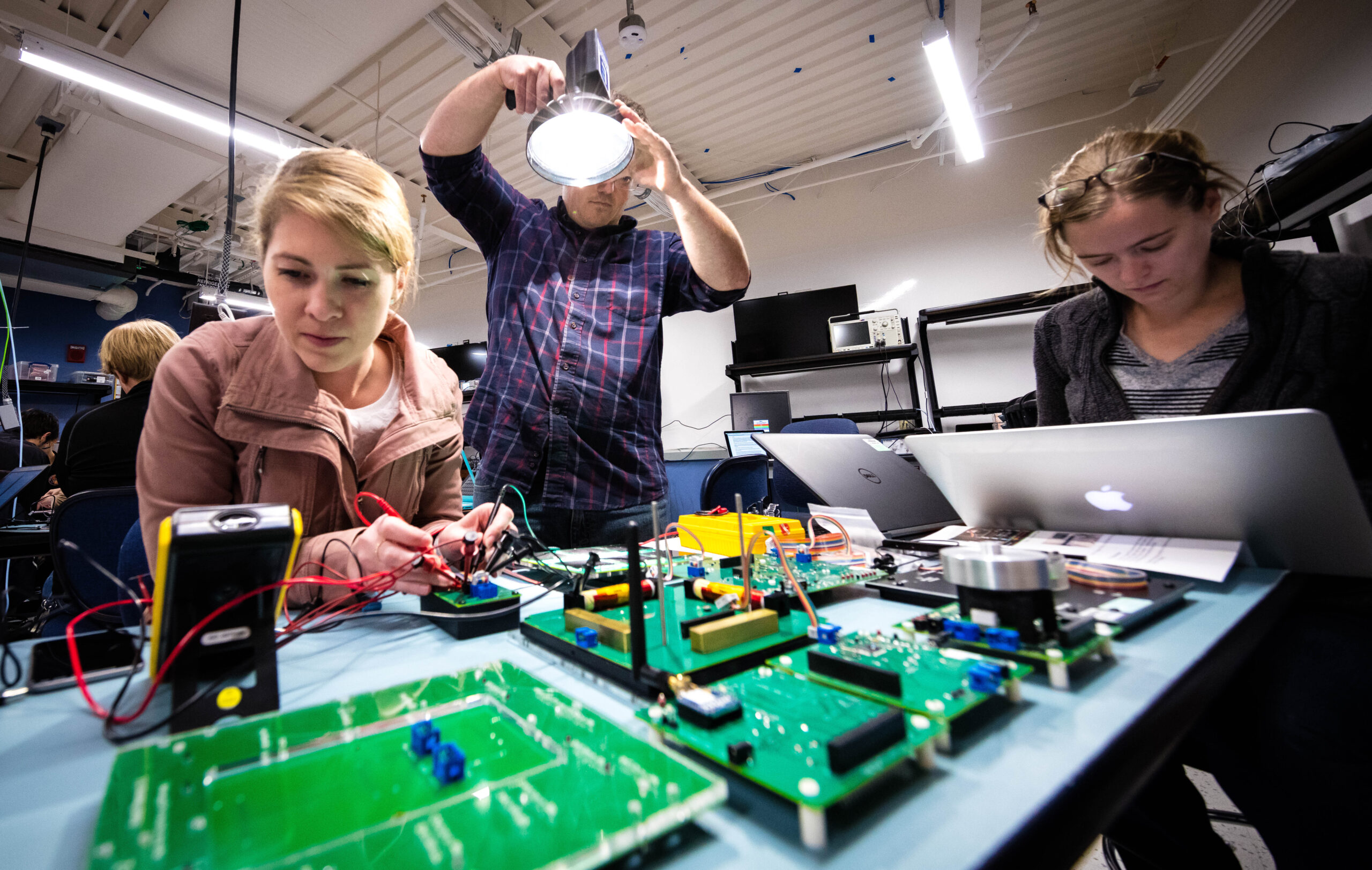Coursework for ADAM trainees, whether for MS or PhD students, is designed to ensure that all participants share core knowledge on which to build an AI-driven semiconductor-focused competency. The core curriculum will provide a common base of skills and language to participants, providing a strong preparation for their chosen career tracks and to explore amongst career tracks. The coursework provides flexibility as students follow their career goals.

-
Five fundamental courses (30 Credits)Internship experienceAnnual workshops and monthly eventsCareer guidance and personalized mentoring
Find High-paying R&D, design, and manufacturing jobs across 49 states
2025
277,000
1.6
$170,000
$275
Workers
Million Jobs
Average Income
Billion in sales
2030
319,000
2.13
$200,00
>$400
Required Courses
Fundamental Core Course: EN.520.495 Microfabrication Laboratory (3 credits)
Students have the opportunity to select a minimum of 4 courses from the following 3 areas. At least one course must be taken in each of the three areas.

Foundations of AI/ML
| Course Code | Title |
|---|---|
| AS.030.601 | Statistical Mechanics (now to include AI/ML) |
| EN171.749 | Machine Learning for Physicists |
| EN.515.646 | Artificial Intelligence Methods for Materials Science |
| EN.520.612 | Machine Learning for Signal Processing |
| EN.520.637 | Foundations of Reinforcement Learning |
| EN.520.638 | Deep Learning |
| EN.520.640 | Machine Intelligence on Embedded Systems |
| EN.520.650 | Machine Intelligence |
| EN.520.656 | Data Smoothing Using Machine Learning |
| EN.520.661 | AI and Biometric Systems: Techniques, Applicatons, and Ethics |
| EN.520.665 | Machine Perception |
| EN.540.605 | Modern Data Analysis & ML for ChemBEs |
| EN 553.636 | Intro. to Data Science |
| EN.601.664 | Artificial Intelligence |
| EN.601.675 | Machine Learning |
| EN.601.773 | Machine Social Intelligence |
| EN.635.603 | AI/ML Ops |
| EN.705.604 | Production Artificial Intelligence (AI) Systems |
| EN.705.605 | Introduction to Generative AI |

Strategies for Innovation and Design
| Course Code | Title |
|---|---|
| EN 540 440 | “Micro/Nanotechnology: The Science and Engineering of Small Structures” (Gracias) |
| EN 520 605 | Advanced Optical and Optoelectronic Instruments and Devices (Khurgin) |
| EN 520 607 | Introduction to the Physics of Electronic Devices (Khurgin) |
| EN 520 624 | “Integrated photonics: from Inverse Design to Hardware Accelerators” (Foster) |
| EN 520 644 | FPGA Synthesis Lab (Pouliquen) |
| EN 520 668 | Advanced Electronic Lab Design (Andreou) |
| EN 520 670 | “Photovoltaics and Energy Devices” (Thon) |
| EN 520 685 | Advanced Semiconductor Devices (Khurgin) |
| EN 520 691 | CAD Design of Digital VLSI Systems I (Mohsenin) |
| BU.610.710 | Sustainable Supply Chains |
| BU.920.606 | Operations Management |

Track-specific electives
| Course Code | Title |
|---|---|
| EN.662.645 | Management and Global Team Leadership (3 credits) |
| EN.663.660 | Managing People and Resolving Conflicts (1.5 credits) |
| EN.663.670 | Project Management (1.5 credits) |
| EN.663.671 | Leading Change (1.5 credits) |
| EN.663.676 | Demand Discovery: Finding and Creating Customer Value (1.5 credits) |
| EN.663.683 | Key Skills for Successful Product Managers (1.5 credits) |
| EN.663.708 | Strategies for New Managers (1.5 credits) |
| EN.663.709 | Leadership Beyond Management (1.5 credits) |
| EN.663.710 | Data-informed Strategy and Visualization (1.5 credits) |
| EN.663.711 | AI Project Management (1.5 credits) |
| EN.663.713 | Strategic Lessons: Success, Failure, and the Contingency of Corporate Decisions (1.5 credits) |
| EN.663.714 | Emerging Technologies: Policy and Global Governance (1.5 credits) |


